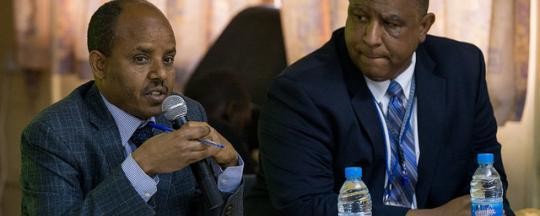The Ethiopian general who is heading the ceasefire monitors in South Sudan says that the ceasefire in the country is “generally respected” but also reports “appalling” incidents of violence in Wau recently, other violations, restrictions on the movement of the ceasefire monitors, as well as harrassment and intimidation of the monitors.
General Molla Hailemariam heads the Ceasefire and Transitional Security Arangements Monitoring Mechanism (CTSAMM), which reports to the Joint Monitoring and Evaluation Commission (JMEC) headed by former Botswana President Festus Mogae.
The following are Gen. Molla’s prepared remarks at the 8th CTSAMM meeting held at Crown Hotel in Juba today.
Ladies and gentlemen,
Good morning.
On this last day of the first half of 2016, I would like to recap some progress in the implementation of the Permanent Ceasefire and Transitional Security Arrangements (PCTSA) as well as the achievements CTSAMM has made to date with the support of the Parties and regional and international partners.
The permanent ceasefire is generally respected by all Parties and the security situation is relatively calm in most parts of the country notwithstanding tensions and incidents in some areas. Phase I of the transitional security arrangement in Juba has been successfully implemented with the returning of 1392 SPLM/A-O security forces to Juba, while the Government has also redeployed part of its forces to the sites at least 25km outside Juba town. These were essential steps paving way for the formation of the TGoNU. In addition, important institutions such as the JMCC, the SDSR and JOC have been set up. Discussions on Phase II of the transitional security arrangements in Juba has also been put on agenda.
CTSAMM has followed the situation closely and played an important role in monitoring and verifying the compliance by the parties of the PCTSA. Since the beginning of this year, we focused our work on monitoring the implementation of permanent ceasefire, supporting and verifying the Phase I of transitional security arrangements in Juba and verifying allegations of violations of the PCTSA. CTSAMM has also made effort to enhance its capacity building. The MVTs have been expanded from 6 to 10.
Yet, the recent weeks have witnessed limited progress in the implementation of the PCTSA. It is worrisome that violence continued to occur, as evidenced by the clashes that broke out in Kajo-Keji, Central Equatoria, Raja, Western Bahr El Ghazal, Leer, Unity State and the most recent and appalling fighting in Wau, Western Bahr El Ghazal last week. The shooting at two cars belonging to the SPLM-IO in Juba is deploring. It is also disappointing that the selection and establishment of cantonment sites is yet not in sight, which has left CTSAMM unable to undertake meaningful verifications.
CTSAMM is deeply concerned at the above mentioned incidents. We have dispatched MVTs to verify the shooting at SPLM-IO cars in Juba, the incidents in Leer and Wau respectively.
The recent incidents and clashes in various parts of the country are clear indication of the fragility of the security situation. CTSAMM urges the parties to honor their commitments to uphold the provisions of the PCTSA and refrain from taking any action that may lead to escalation of tension. It is critical for the TGoNU to start the process of establishment of cantonment sites without delay and ensure well functional national architecture and relevant security institutions as provided for in the peace agreement. The importance of confidence building between the Parties at all levels cannot be overemphasized.
As repeatedly reported, CTSAMM has long faced with huge challenges in terms of freedom of movement. The situation is not improved but worsened in some areas. A series of impediment and restrictions, harassment and intimidation against CTSAMM occurred despite strong calls for unhindered access be granted to CTSAMM. The detention of MVT personnel repeated yesterday in Torit. It is unacceptable to allow this kind of impediment and harassment against MVTs continue. Let’s put it clear, a functioning CTSAMM with freedom of movement is supporting the peace process whist a paralyzed CTSAMM will in no way serve the interests of the people of South Sudan. It is our earnest hope that TGoNU would be able to take decisive actions to ensure freedom of movement for CTSAMM.
At this critical phase of peace process, CTSAMM needs to enhance its role in monitoring and verifying the compliance by the Parties of the PCTSA. We have recently developed a matrix of upcoming verification activities which requires consistent support and cooperation from JMEC, the TGoNU and other partners. We will soon start a semi-annual review of the mission to improve its efficiency and effectiveness. That being said, I want to underscore that commitment by the Parties to peace and continued support from all partners are essential to the success of CTSAMM.
Thank you.
File photo




